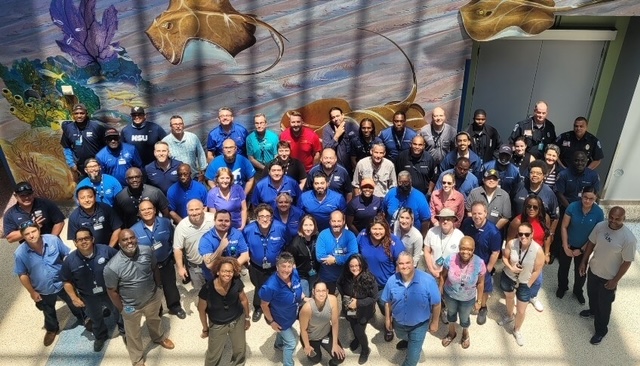
Invocation
We all know the tradesman’s golden rule “measure twice, cut once.” Carpenters, electricians, plumbers, HVAC techs, etc., all swear by this rule and use it daily.
However, have you stopped to consider if there is a golden rule for leaders in Facilities Management (FM)? Can we benefit from “measuring twice” and “cutting once,” concerning developing and maintaining high levels of integrity among our team? One of APPA’s core values is integrity, and in the world of FM, maintaining integrity is crucial for ensuring both efficiency and safety.
The principle of “trust but verify” was popularized by former U.S. President Ronald Reagan during the Cold War era. Although a little dated, it still has profound relevance in modern leadership practices. It advocates for a balanced approach to trusting your team and systems, while also implementing measures to verify that everything functions as intended. This approach enhances operational integrity and builds a culture of accountability and transparency.
The principle of “trust but verify,” is rooted in the understanding that while trust is essential for effective team dynamics, having a solid verification process is equally important for ensuring that your trust is well-placed. This principle can be applied across various domains—for example, vendor management, preventative maintenance, safety protocols, licensing, project management, legal or regulatory compliance, and remote supervision of team members.
Three Key Principles to Build Trust:
- Hiring and Training: Trust starts with the recruitment process. Hiring competent and ethical staff is foundational. Once hired, thorough training ensures that employees understand their responsibilities and the standards they must uphold. Regular training sessions help keep everyone informed about best practices and any changes in regulations.
- Clear Communication: Establishing clear lines of communication helps build trust. Regular updates, feedback sessions, and transparent reporting foster an environment where employees feel valued and understood. Clear communication also ensures everyone is on the same page regarding expectations and goals.
- Empowering Employees: Trust is strengthened when employees are given autonomy and responsibility. Empowered employees are more likely to take ownership of their roles and adhere to high performance standards. Providing them with the necessary tools and resources enhances their ability to perform effectively.
Four Key Principles to Verify:
- Regular Inspections: Regular inspections are vital to ensure that maintenance tasks and operational procedures are carried out correctly. Scheduled and unscheduled inspections help identify issues before they escalate, ensuring the facility remains in top condition.
- Performance Metrics: Implementing key performance indicators (KPIs) allows for objective performance measurement. Tracking metrics such as energy efficiency, downtime, and response times provides tangible evidence of how well facilities management processes work and highlights improvement areas.
- Audits and Compliance Checks: Regular audits and compliance checks help verify that all systems and procedures meet regulatory standards. These checks can be internal or performed by third-party organizations. They ensure that the facility is compliant with laws and adhering to industry best practices.
- Feedback Mechanisms: Encouraging feedback from both employees and occupants of the facility provides valuable insights into areas of concern. Structured feedback mechanisms—such as surveys and suggestion boxes—help capture issues that may not be immediately apparent through routine inspections.
Balance Trust and Verification
The balance between trust and verification is delicate but crucial. Excessive verification can lead to micromanagement—undermining employee trust and morale. Conversely, insufficient verification can lead to unchecked problems and compliance risks. Striking the right balance involves the following:
Three Key Principles for Balance:
- Setting Clear Expectations: Clearly outline expectations and standards so all team members understand what is required. This clarity helps ensure everyone is aligned and can be trusted to meet the set standards.
- Encouraging Self-Verification: Promote a culture where employees are encouraged to self-assess their work and identify areas for improvement. This approach fosters a sense of ownership and responsibility.
- Using Technology Wisely: Leverage technology—such as building management systems and automated reporting tools—to streamline verification processes. Technology can provide real-time data and alerts, facilitating more efficient and accurate verification.
Conclusion
APPA provides a wide range of training and development programs for leaders at all levels of your organization. The principle of “trust but verify” is a powerful tool for enhancing integrity and ensuring operations run smoothly. Most importantly, it could save a life or avoid complex legal battles over lack of regulatory compliance. An accountable work environment is a productive and safe work environment.
Attend APPA U, get the CEFP certification, attend your regional conference, or grab a seat in the next Supervisor’s Toolkit. Know that APPA wants to see your leadership skills grow. I challenge you to “TRUST but Verify” what APPA offers. Always be confident that your “membership matters.”
Mallica Reynolds, M.S., LMFT, CEFP, is assistant director of regional facilities at Nova Southeastern University in Fort Lauderdale, FL. He is the SRAPPA Membership Liaison and can be reached at [email protected].
Membership Matters
Explores the community benefits of leadership in educational facilities for professionals seeking to build their careers, transform their institutions, and elevate the value and recognition of facilities in education. To contribute, contact Kevin Willmann, FM Column Editor.
See all Membership Matters.


